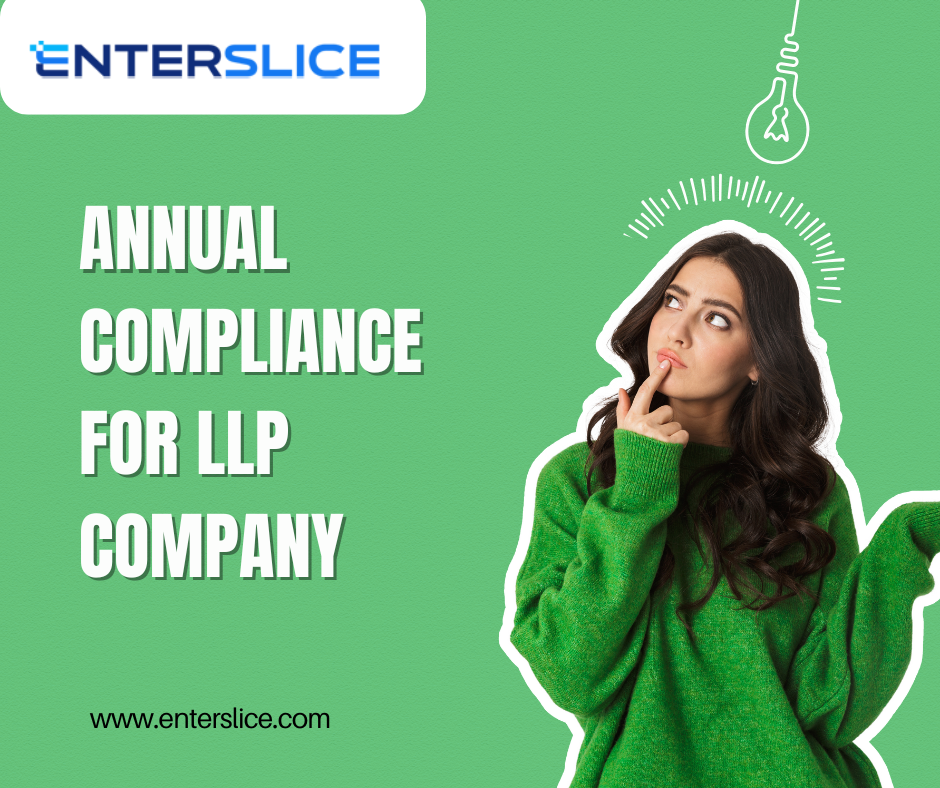What is Annual Compliance for LLP Company? Annual compliance refers to the filing of mandatory returns, statements, and documents with the government every financial year. Unlike private limited companies, LLPs have relatively relaxed reporting requirements, but compliance is still legally required. Why Annual Compliance Matters for LLPs Many small businesses assume that LLPs don't need rigorous compliance due to their flexible nature. This is a misconception. Non-compliance can lead to: Hefty Penalties: Late filing of Form 8 or Form 11 can attract a fine of ₹100 per day with no upper cap. Legal Actions: Prolonged non-compliance can result in the LLP being declared as ‘defunct’ or even struck off. Limited Access to Credit or Investment: Investors and banks check compliance history before entering into any relationship. Loss of Credibility: Regulatory non-compliance reflects poorly on business ethics and management. How Enterslice Helps with LLP Annual Compliance Enterslice provides comprehensive solutions for annual compliance for LLP company with a dedicated team of compliance experts, legal advisors, and chartered accountants. Here’s how we make compliance hassle-free: Dedicated Account Manager: A single point of contact to manage your compliance calendar and paperwork. Timely Filing: We ensure all forms are filed well within deadlines to avoid penalties. Audit Assistance: From selecting the auditor to preparing financials, we guide you through the audit process if applicable. End-to-End Support: Whether it’s filing MCA forms, ITR, or maintaining statutory records—we handle everything. We also offer advisory services to help LLPs improve their internal controls and be future-ready for due diligence or funding. Common Mistakes to Avoid Ignoring compliance when there's no business activity Missing filing deadlines Not maintaining proper books of account Assuming LLPs are exempt from ITR Waiting till the last minute to begin compliance work Enterslice ensures you avoid these costly mistakes by taking a proactive, organized approach to your compliance schedule. When Should You Start? The earlier, the better. Compliance is not something you can complete overnight. Start early in the financial year to gather the necessary financial records, verify partner details, and prepare documentation. If you're unsure about your obligations or missed a previous deadline, reach out to Enterslice for an immediate compliance health check. FAQs 1. What happens if an LLP fails to file annual compliance forms? Non-compliance attracts a penalty of ₹100 per day per form, with no maximum cap. It can also affect the LLP’s legal standing. 2. Is audit mandatory for every LLP? No, audit is only required if turnover exceeds ₹40 lakh or capital contribution is above ₹25 lakh. 3. Can an LLP be closed if it has not complied for several years? Yes, the ROC can strike off an LLP for continuous non-compliance. Regular filings are crucial to maintaining active status. 4. Can Enterslice help if I missed last year's compliance? Absolutely. We offer delayed compliance services and help you get back on track without legal hurdles. Some of the essential annual compliances include: Filing of Form 11 (Annual Return) Filing of Form 8 (Statement of Account & Solvency) Filing of Income Tax Return (ITR) Audit (if applicable based on turnover) These filings are not just paperwork; they reflect the financial health, operational transparency, and legal status of your LLP. Key Components of LLP Annual Compliance 1. Form 11 – Annual Return Every LLP must file Form 11 with the Registrar of Companies (ROC) within 60 days of the financial year-end (i.e., by May 30 every year). This form captures the basic details of partners and the structure of the LLP. Even if there’s no business activity during the year, Form 11 filing is mandatory. 2. Form 8 – Statement of Account and Solvency Form 8 is due by October 30 each year. It includes details about the financial position, assets and liabilities, income and expenditure, and a declaration of solvency. If your LLP has an annual turnover of over ₹40 lakh or capital contributions exceeding ₹25 lakh, an audit is also required. 3. Income Tax Return Filing All LLPs must file an Income Tax Return (ITR) every year, irrespective of their turnover or activity. The deadline for non-audited LLPs is July 31, while audited LLPs must file by October 31. 4. Audit Requirement An LLP is only required to undergo a tax audit if its annual turnover exceeds ₹40 lakh or its capital contribution is above ₹25 lakh. The audit must be done by a practicing Chartered Accountant.






















